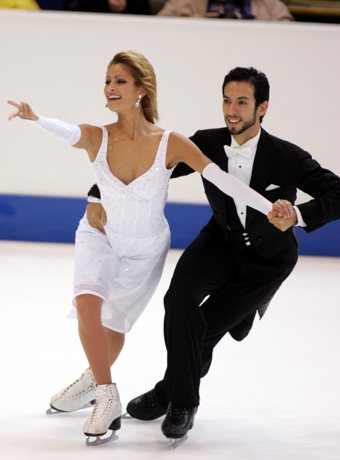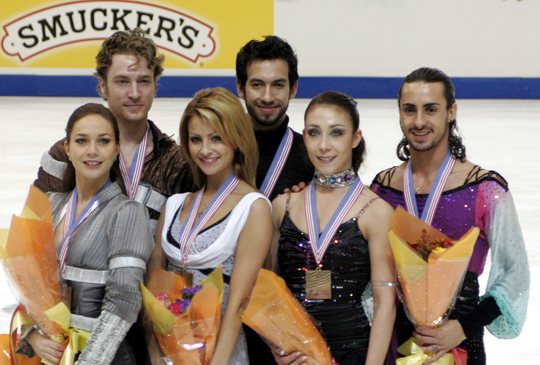|
Belbin & Agosto Take Lead with Elegant Austrian Waltz Four-time U.S. dance champions Tanith Belbin & Benjamin Agosto spent much of the summer going "back to basics," and the extra work paid dividends Friday night, when the couple fairly floated across the ice during their Austrian Waltz and took a 1.47-point lead at Skate America. "It felt very strong," Belbin said. "We tried to make improvements in the tightness of our positions and our free leg extension. It could have been a bit bolder; it was a little conservative, which is always the case at the beginning of the season. But it was a good start." "I think this was a breakthrough for us; we really felt comfortable," Agosto added. As one competitor remarked, the light, elegant waltz in three-quarters time "is hard to skate, but when you do it well you make it look easy." With Belbin in a long white dress with silver sequins and handless white gloves, and Agosto in white tie and tails, the couple certainly looked the part. They skated with good leg unison, speed and an airy quality. The only jarring note was the usually well-coiffed Belbin’s unruly hair. The Americans earned 36.03 points (TES 17.86 + PCS 18.17). French silver medalists Nathalie Pechalat & Fabian Bourzat, who won the bronze medal at this event last season, were equally elegant, and attacked the waltz with good speed. They placed second with 34.56 points (TES 17.36 + PCS 17.20). "We spent three weeks in Moscow this summer to study with Alexander Zhulin, and I think that helped our compulsory dances, especially the edges and flow," Bourzat said. Usually, the couple trains at Muriel Boucher-Zazoui’s school in Lyon. Italians Federica Failla & Massimo Scali were also impressive, performing the waltz in close holds with elegant arm positions. Failla wore a lovely backless dress in shades of blue and aqua, and Scali donned black tie and tails. They are third with 31.43 points (TES 16.30 + PCS 15.13). "We feel strong, much better than last season," Scali said. "The last few years have been very difficult. We changed coaches (to Pasquale Camerlengo), we moved (to the Detroit Skating Club), and then I had visa problems after (’07) Europeans. It really hurt our training, but we are looking for better results now." The Italians were sixth at ’07 Europeans and ninth at ’07 Worlds. Kristin Fraser & Igor Lukanin of Azerbaijan, who train in Hackensack under Nikolai Morozov, impressed the judges with their speedy, confident waltz, placing fourth with 31.19 points (TES 15.88 + PCS 15.31). U.S. bronze medalists Meryl Davis & Charlie White, who like Belbin & Agosto train in Canton, MI under Igor Shpilband and Marina Zoueva, skated in a light, easy style that looked especially fast on the turns. They sit fifth with 30.16 points (TES 15.62 + PCS 14.54). "We skated it well, and we feel good about it," White said. "We practiced it for an hour a day. It’s a hard compulsory; we did Golden Waltz last year, and it’s definitely easier than that, but it’s not easy." "There are definitely aspects of this dance that make it exciting," added Davis. "The ladies’ twizzle adds a certain amount of excitement, at least if you’re the one doing it." U.S. pewter medalists Kim Navarro & Brent Bommentre had a smooth, fast outing that gained surprisingly low marks from the judges. They sit sixth with 27.90 points. "We were really pleased; it felt like we were right where we wanted to be, in terms of the timing," Navarro said. The couple’s coaches, Robbie Kaine and Cheryl Demkowski Snyder, were a bit perplexed. "I don’t know (about the marks)," Kaine said. "They were smooth and quiet, and dead on with the timing." Kaine speculated that the ISU’s new procedure of having skaters compete in the order of their world rankings, rather than via a blind draw, may be having an impact. "Kim and Brent have never been to Worlds, and they skated in the first group," he said. Other coaches have remarked that ISU Junior Grand Prix placements are weighted too heavily, and some younger skaters just off the junior circuit are gaining undeservedly higher rankings than more experienced competitors. Alexandra & Roman Zaretski, the brother-and-sister Israeli couple who recently changed coaches from Evgeni Platov to Galit Chait and Nikolai Morozov, had a near-disaster when Alexandra hit Roman’s boot with her toe toward the end of the second pattern, nearly causing a fall. They placed seventh with 27.80 points. Ekaterina Rubleva & Ivan Shiefer of Russia, who placed third at the 2007 Russian Nationals, skated a clean waltz with good ice coverage. Elegantly clad in a white and silver sequined dress (Rubleva) and white tie and tails (Shiefer), they placed eighth with 26.95 points. Representing Japan, the U.S.-born Cathy & Chris Reed did not show their best lines, and appeared a bit slow, perhaps due to Chris Reed’s knee problems, which have curtailed their training time for several months. They earned 26.47 points for ninth place. Xiaoyang Yu & Chen Wang of China made an elegant appearance, but had several awkward moments and were a bit hesitant and far apart at times. They sit in 10th place with 22.14 points. |
|||||||||||||||||||||||||||||||||||||

